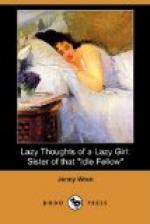He writes that this one wants a little “animation,” that one “sings out of tune.” Miss So-and-So plays the piano “with faultless manipulation, the only drawback being a slight preponderance of pedal,” and so on. He generally has as good an ear for music as a parish priest who only knew two tunes: one of which was “God save the Queen,” and the other wasn’t. And once, when a brass band was playing a selection outside the vicarage, he went on to his balcony, hat in hand, and waved it vigorously as he commenced to sing the first line of “God save the Queen.”
Well, it does not matter after all. The only object is to appear learned, and to use long words. If the artists do not like being ignorantly criticized they must forbear to appear in public, a result which would incline us to go and shake hands with the reporters all round in the exuberance of our gratitude.
CHAPTER XI.
ON DANCING.
I was looking through a “Querist Album” the other day; one of those dreadful confession books in which you are required to answer the most absurd questions. Dreadful indeed they are to write in, but not altogether uninteresting to peruse, though the interest comes not so much in the answers themselves as in the manner in which they are written.
Some go in for it seriously, and describe their inmost feelings on the pages; some take a witty strain, and put down the most ridiculous things they can think of; while others write just what comes first.
Some are such hypocrites, too. Here is a man who describes his wife as his ideal woman; and when we know that he scarcely ever addresses a civil word to the poor little woman, his admission is, to say the least of it, amusing.
“Have you ever been in love? and if so, how often?” This is one of the questions. The answers to it are of doubtful veracity. All the single ladies reply “Never!” underlining the word three times. “Yes, only once,” is the statement of the married ones. According to the Querist Album, “The course of true love always runs smooth.” No one seems to be attacked by Cupid but they must immediately marry the object of their choice, and “all goes merrily as a marriage bell.” The men, on the contrary, like to appear somewhat inflammable. It is generally the masculine writers who adopt the sprightly key. Twenty—forty—thousands of times they admit falling in love. Such one-sided affairs they must have been, too; for the girls, according to their own confessions, never reciprocated any attachment until their rightful lords and masters appeared on the scene. I am afraid we must be a very hard-hearted race!




